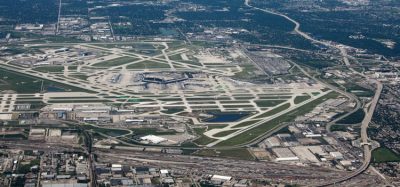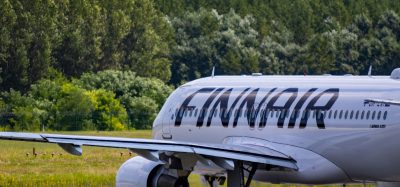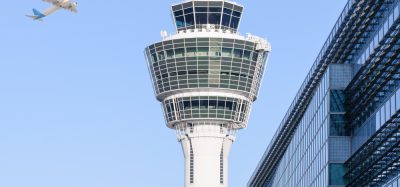Reimagining sustainability at Venice Airport – from AI to hydrogen drones
Posted: 25 August 2025 | Holly Miles | No comments yet
Venice Airport’s bold sustainability strategy blends agrivoltaics, hydrogen, AI, and biodiversity protection, proving that the future of aviation must be innovative, integrated, and deeply human-centred. Head of Sustainability at Gruppo SAVE Group, Davide Bassano, tells International Airport Review.


As climate pressures mount and decarbonisation deadlines loom, airports around the world are searching for ways to accelerate their sustainability efforts. At Venice Airport (VCE) and its sister sites managed by SAVE Group, the approach is striking in both its scope and originality – spanning agrivoltaic solar energy, hydrogen-powered drones, AI for climate control, and even trained falcons for wildlife management.
Speaking with Davide Bassano, Head of Sustainability at Gruppo SAVE Group, one thing is immediately clear: they are treating the climate crisis not just as a technical challenge, but as an operational, environmental and human one.
Ambitious energy goals: agrivoltaics and hydrogen integration
The group has committed to achieving net zero by 2030 – a highly ambitious timeline – and it’s backing that pledge with action. “We fixed the target to be net zero within 2030, so it’s a very short time,” said Davide. “In the next master plan, we’ve already planned to dismiss any fossil fuel and to provide all energy demands of the airport with renewable power sources.”
One of the most innovative parts of this plan is a 68 MW agrivoltaic system – solar panels installed above land still usable for agriculture. “It seems quite smart, actually, because we don’t deplete any environmental value of the ground and at the same time we match the energy demands of the airport,” he explained. The project is currently undergoing environmental ministry approval.
The airport is also integrating hydrogen production on-site. Using surplus renewable energy, SAVE plans to power airport vehicles and local public transport. “Our idea is to make any connection with the airport provided by the local transportation company green,” said Davide.
Hydrogen drones and the future of airside logistics
SAVE Group is exploring the use of hydrogen-powered drones to deliver urgent medical supplies from Padua Airport to regional hospitals. These drones offer longer range and lighter weight than their battery-powered counterparts, and the hydrogen will be produced using solar-powered electrolysis.
But the main challenge isn’t the drone, the vertiport, or the electrolyser – it’s the regulatory framework. “We are dealing with urban traffic over the city centre and there are a lot of rules still missing,” said Davide. The goal is to conduct the first prototype flights in late 2026.
Biodiversity: where falcons and flamingos coexist with aircraft
Two new falcons have recently joined the staff at Venice Airport for deterrent action and removal of flocks of birds. So why do they use real birds instead of technology?
“It seems from the medieval age, but in fact they are very effective,” said Davide. “The use of falcon is very selective… they recognise the species, they act, and the result is the storm of birds around understand immediately that it is a forbidden area. There are other methods like the small guns, sirens or acoustic devices, but they are very disturbing for the rest of the biodiversity.”
What’s even more surprising is that some protected bird species are choosing the airport grounds as a rest and breeding area to get away from the urban activity of the city. “Once they have learned not to interfere with the airport operations they have their own area, and they rest, they reproduce… and it doesn’t seem to affect the safety of the operation. It reverts the paradox that the airport is a noisy, polluted area,” said Davide.
Climate adaptation: it’s about infrastructure – and people
One of the most forward-thinking elements of SAVE’s strategy is its recognition that climate change impacts human performance, not just infrastructure. In a 2024 assessment, they evaluated how extreme heat affects airport workers, particularly those on the apron. Airport workers were included as an “asset” in the assessment.
“If you need to work for eight hours in a terminal with 45 degrees, it’s quite heavy for our staff,” said Davide. The airport has introduced hydration stations, rest areas, and is researching protective uniforms, such as glasses and new types of hats.
We realised it’s important to also consider the human capital, the worker, and if their performance decreases because of climate change
They have also begun integrating occupational health and safety into their climate risk assessments. “We realised it’s important to also consider the human capital, the worker, and if their performance decreases because of climate change,” Davide said, noting that 40% of their operations rely on short turnaround times from local carriers.
AI and Scope 3: 30% energy savings already
To reduce Scope 3 emissions, Venice Airport is using an AI-powered terminal climate control system that anticipates passenger flows and adjusts temperatures accordingly. “We try to set the proper temperature using the forecast of people in the area,” said Davide. Since its implementation in late 2023, the system has saved almost 30% in energy. It’s now being rolled out at Verona Airport too.
Circular economy: incentivising better waste sorting
SAVE is promoting a circular economy through both infrastructure and behavioural nudges. A new pneumatic waste collection and sorting system has been deployed across its airports, and they have also started charging tenants based on the volume and type of waste they generate. “We count the number of the bins, and we invoice the service,” said Davide. “When you touch the pockets, you get immediate results!”
A holistic sustainability ethos
From smart infrastructure to sustainable transport, from protecting biodiversity to supporting the wellbeing of apron workers, Venice Airport’s strategy goes well beyond carbon calculations.
For sustainability professionals in airports worldwide, Gruppo Save’s approach is a powerful reminder: the future of aviation isn’t just electric or hydrogen – it’s integrated, humane and boldly inventive.
Listen to Davide talk in-depth about how they are promoting circular economy in their airports in our on-demand webinar.


Davide Bassano joined Gruppo Save, which operates Venice, Treviso, Verona and Brescia Airports, in 2003. Since 2021 he has been Director of Sustainability.
Davide holds a PhD Degree in Mining Engineering with specialisation in Offshore Drilling, as well as a Postgraduate master’s degree in industrial logistics and management systems.
He worked in companies in the industrial sector and then moved on to consulting and certification in international companies, first in Norway and then in Germany.
The International Airport Summit is open for registration!
Date: 19 – 20 November 2025
Location: JW Marriott Hotel Berlin
At our flagship event of the year, we will dive into the future of airport operations, with expert-led sessions on passenger experience, innovative smart technologies, baggage handling, airside operations, data, security, and sustainability.
This is where global airport leaders come together to share insights, challenges, and real-world solutions.
Limited complimentary passes are available for eligible professionals – first come, first served!
Related topics
Artificial intelligence (AI), Biodiversity, Drones, Emissions, Green energy, Hydrogen, Social responsibility, Sustainability, Sustainable development


















